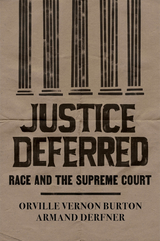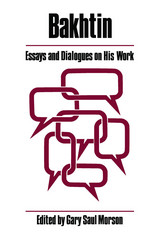
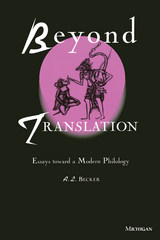

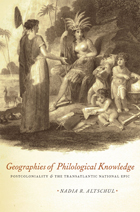
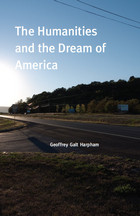
In this bracing and original book, Geoffrey Galt Harpham argues that today’s humanities are an invention of the American academy in the years following World War II, when they were first conceived as an expression of American culture and an instrument of American national interests. The humanities portray a “dream of America” in two senses: they represent an aspiration of Americans since the first days of the Republic for a state so secure and prosperous that people could enjoy and appreciate culture for its own sake; and they embody in academic terms an idealized conception of the American national character. Although they are struggling to retain their status in America, the concept of the humanities has spread to other parts of the world and remains one of America's most distinctive and valuable contributions to higher education.
The Humanities and the Dream of America explores a number of linked problems that have emerged in recent years: the role, at once inspiring and disturbing, played by philology in the formation of the humanities; the reasons for the humanities’ perpetual state of “crisis”; the shaping role of philanthropy in the humanities; and the new possibilities for literary study offered by the subject of pleasure. Framed by essays that draw on Harpham’s pedagogical experiences abroad and as a lecturer at the U.S. Air Force Academy, as well as his vantage as director of the National Humanities Center, this book provides an essential perspective on the history, ideology, and future of this important topic.

Michel Foucault observed that “the birth of philology attracted far less notice in the Western mind than did the birth of biology or political economy.” In this penetrating exploration of the origin of the discipline, Maurice Olender shows that philology left an indelible mark on Western visions of history and contributed directly to some of the most horrifying ideologies of the twentieth century.
The comparative study of languages was inspired by Renaissance debates over what language was spoken in the Garden of Eden. By the eighteenth century scholars were persuaded that European languages shared a common ancestor. With the adoption of positivist, “scientific” methods in the nineteenth century, the hunt for the language of Eden and the search for a European Ursprache diverged. Yet the desire to reconcile historical causality with divine purpose remained.
Because the Indo-European languages clearly had a separate line of descent from the biblical tongues, the practitioners of the new science of philology (many of whom had received their linguistic training from the Church) turned their scholarship to the task of justifying the ascendance of European Christianity to the principal role in Providential history. To accomplish this they invented a pair of concepts—Aryan and Semitic—that by the end of the century had embarked on ideological and political careers far outside philology. Supposed characteristics of the respective languages were assigned to the peoples who spoke them: thus the Semitic peoples (primarily the Jews) were, like their language, passive, static, and immobile, while the Aryans (principally Western Europeans) became the active, dynamic Chosen People of the future.
Olender traces the development of these concepts through the work of J. G. Herder, Ernest Renan, Friedrich Max Müller, Adolphe Pictet, Rudolph Grau, and Ignaz Goldziher. He shows that, despite their different approaches, each of these men struggled more or less purposefully “to join romanticism with positivism in an effort to preserve a common allegiance to the doctrines of Providence.”
With erudition and elegance, Olender restores the complexity and internal contradictions of their ideas and recreates the intellectual climate in which they flourished.
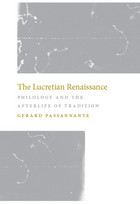
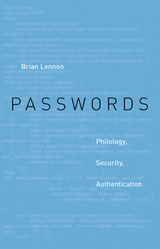
Cryptology, the mathematical and technical science of ciphers and codes, and philology, the humanistic study of natural or human languages, are typically understood as separate domains of activity. But Brian Lennon contends that these two domains, both concerned with authentication of text, should be viewed as contiguous. He argues that computing’s humanistic applications are as historically important as its mathematical and technical ones. What is more, these humanistic uses, no less than cryptological ones, are marked and constrained by the priorities of security and military institutions devoted to fighting wars and decoding intelligence.
Lennon’s history encompasses the first documented techniques for the statistical analysis of text, early experiments in mechanized literary analysis, electromechanical and electronic code-breaking and machine translation, early literary data processing, the computational philology of late twentieth-century humanities computing, and early twenty-first-century digital humanities. Throughout, Passwords makes clear the continuity between cryptology and philology, showing how the same practices flourish in literary study and in conditions of war.
Lennon emphasizes the convergence of cryptology and philology in the modern digital password. Like philologists, hackers use computational methods to break open the secrets coded in text. One of their preferred tools is the dictionary, that preeminent product of the philologist’s scholarly labor, which supplies the raw material for computational processing of natural language. Thus does the historic overlap of cryptology and philology persist in an artifact of computing—passwords—that many of us use every day.
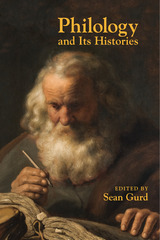
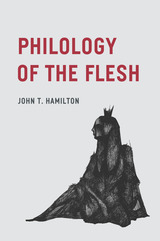
In Philology of the Flesh, John T. Hamilton explores writing and reading practices that engage this notion in a range of poetic enterprises and theoretical reflections. By pressing the notion of philology as “love” (philia) for the “word” (logos), Hamilton’s readings investigate the breadth, depth, and limits of verbal styles that are irreducible to mere information. While a philologist of the body might understand words as corporeal vessels of core meaning, the philologist of the flesh, by focusing on the carnal qualities of language, resists taking words as mere containers.
By examining a series of intellectual episodes—from the fifteenth-century Humanism of Lorenzo Valla to the poetry of Emily Dickinson, from Immanuel Kant and Johann Georg Hamann to Friedrich Nietzsche, Franz Kafka, and Paul Celan—Philology of the Flesh considers the far-reaching ramifications of the incarnational metaphor, insisting on the inseparability of form and content, an insistence that allows us to rethink our relation to the concrete languages in which we think and live.
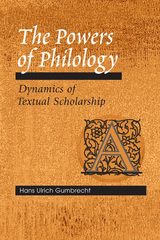
For two and a half millennia philologists have viewed themselves as the modest heirs and curators of their textual past's most glorious periods, collecting and editing text fragments, historicizing them and adding commentary, and ultimately teaching them to contemporary readers.
Gumbrecht argues for a return to this tradition as an alternative to an often free-floating textual interpretation and to the more recent redefinition of literary studies as "cultural studies," which risks a loss of intellectual focus. Such a return to philological core exercises, however, can become more than yet another movement of academic nostalgia only if it takes into account the hidden desire that has inspired
philology since its Hellenistic beginnings: the desire to make the past present again by embodying it.
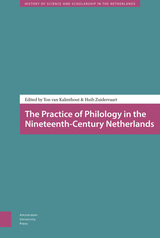
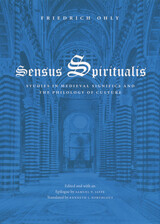
Drawn from the entire career of this great medievalist, who, more clearly and in greater detail than anyone before him, articulated the singularly allegorical mentality of the Middle Ages, the essays in this collection show the tendency of medieval thinkers and writers to see nature as a diaphanous screen held against God's sacred mysteries, simultaneously illuminating and obscuring. Ohly's work on the hermeneutics of word and image, meanwhile, traces the way his thinking opened philology to new possibilities through the dual interpretation of textual and visual media.
Including penetrating essays on poetic inspiration, the nature of beauty, sacred and profane exegesis, history as typology, and art as both object and text, this volume will be of enormous value to scholars of comparative literature, the history of art, and religion during the Middle Ages and Renaissance.
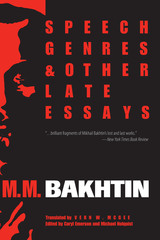
Speech Genres and Other Late Essays presents six short works from Bakhtin's Esthetics of Creative Discourse, published in Moscow in 1979. This is the last of Bakhtin's extant manuscripts published in the Soviet Union. All but one of these essays (the one on the Bildungsroman) were written in Bakhtin's later years and thus they bear the stamp of a thinker who has accumulated a huge storehouse of factual material, to which he has devoted a lifetime of analysis, reflection, and reconsideration.

Verbal Art, Verbal Sign, Verbal Time was first published in 1985. Minnesota Archive Editions uses digital technology to make long-unavailable books once again accessible, and are published unaltered from the original University of Minnesota Press editions.
Roman Jakobson, one of the most important thinkers of our century, was bet known for his role in the rise and spread of the structural approach to linguistics and literature. His formative structuralism approach to linguistics and literature. His formative years with the Russian Futurists and subsequent involvement in the Moscow and Prague Linguistic Circles (which he co-founded) resulted in a lifelong devotion to fundamental change in both literary theory and linguistics. In bringing each to bear upon the other, he enlivened both disciplines; if a literary work was to a him a linguistic fact, it was also a semiotic phenomenon - part of the entire universe of signs; and above all, for both language and literature, time was an integral factor, one that produced momentum and change. Jakobson's books and articles, written in many languages and published around the world, were collected in a monumental seven-volume work, Selected Writings (1962 -1984), which has been available only to a limited readership. Not long before his death in 1982, Jakobson brought together this group of eleven essays—Verbal Art, Verbal Sign, Verbal Time — to serve as an introduction to some of his linguistic theories and especially, to his work in poetics.
Jakobson's introductory article and the editor's preface together suggest the range of his work and provide a context for the essays in this book, which fall into three groups. Those in the first section reflect his preoccupation with the dynamic role of time in language and society. Jakobson challenges Saussure's rigid distinction between language as a static (synchronic) system and its historical (diachronic) development - a false opposition, in his view, since it ignores the role of time in the present moment of language. The essays on time counter the notion that structuralism itself, as heir to Saussure's work, has discarded history; in Jakabson's hands, we see a struggle to integrate the two modes. In central group essays, on poetic theory, he shows how the grammatical categories of everyday speech become the expressive, highly charged language of poetry. These essays also deal with the related issues of subliminal and intentional linguistic patterns of poetry. These essays also deal with the related issues of subliminal and intentional linguistic patterns in poetry—areas that are problematic in structural analysis—and provide exemplary readings of Pushkin and Yeats. The last essays, on Mayakovsky and Holderlin, make clear that Jakobson was aware of the essential (and in these instances, tragic) bond between a poet's life and art. The book closes with essays by Linda Waugh, Krystyna Pomorska, and Igor Melchuk that provide a thoughtful perspective on Jakobson's work as a whole.
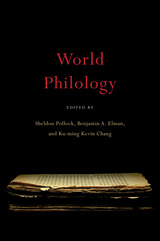
Philology—the discipline of making sense of texts—is enjoying a renaissance within academia after decades of neglect. World Philology charts the evolution of philology across the many cultures and historical time periods in which it has been practiced, and demonstrates how this branch of knowledge, like philosophy and mathematics, is an essential component of human understanding.
Every civilization has developed ways of interpreting the texts that it produces, and differences of philological practice are as instructive as the similarities. We owe our idea of a textual edition for example, to the third-century BCE scholars of the Alexandrian Library. Rabbinical philology created an innovation in hermeneutics by shifting focus from how the Bible commands to what it commands. Philologists in Song China and Tokugawa Japan produced startling insights into the nature of linguistic signs. In the early modern period, new kinds of philology arose in Europe but also among Indian, Chinese, and Japanese commentators, Persian editors, and Ottoman educationalists who began to interpret texts in ways that had little historical precedent. They made judgments about the integrity and consistency of texts, decided how to create critical editions, and determined what it actually means to read.
Covering a wide range of cultures—Greek, Roman, Hebrew, Arabic, Sanskrit, Chinese, Indo-Persian, Japanese, Ottoman, and modern European—World Philology lays the groundwork for a new scholarly discipline.
READERS
Browse our collection.
PUBLISHERS
See BiblioVault's publisher services.
STUDENT SERVICES
Files for college accessibility offices.
UChicago Accessibility Resources
home | accessibility | search | about | contact us
BiblioVault ® 2001 - 2024
The University of Chicago Press




